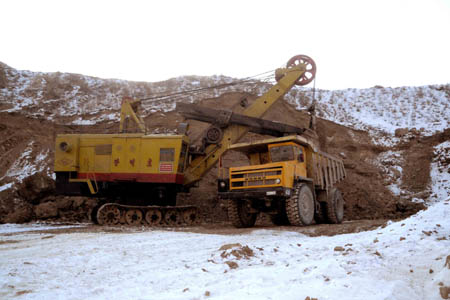The overall economic situation in Musan and North Hamgyong Province is reportedly dire, and has been for years. No specifics can be given. Famines have been reported in the year 2011 and 2012. Although the people of Musan know their hardships, it is reportedly considered one of the better-off towns in North Korea because it lies on the Chinese border, which gives residents an opportunity to (illegal) cross-border trade.
The Musan area has long been known for iron ore mines, lumber, and potatoes. The Musan Mine, a major excavator of iron ore, is located just east of Musan Town proper. In principle, the Musan Mine is one of the largest iron ore mines in the region with a reserve of approximately three billion tonnes of ore.
That said, it must be noticed that in general, over the last decade (2003 - 2013) North Korea’s mining activities have been at low to very low operation rates. Reportedly, the Musan Iron-ore Mine was operating at approximately 30 percent of capacity in the year 2006. Judging from the news that has come out since, it appears as though little improvement has been made.
On the satellite image the mine is clearly visible just east of Musan Town. However, according to Joe Layburn in the documentary "Children of the Secret State", Musan "looks like a ghost town"and according to him the mine has been abandoned, the factories have shut down, and the only people inhabiting the area is the army.
This may indicate that the mine is now mostly operated by the army rather than by civilians working for the State. No confirmation has been gotten as to Joe Layburns given information, ny now however it is clear that until August of 2013 the mine was officially still in operation.
In spring of 2010 India's large Mittal Company is known to have showed interest in the Musan Mining site and its operations. Pramod Mittal, the younger sibling of steel tycoon LN Mittal and head of Global Steel Holdings, was reported to be negotiating with the North Korean government for a stake in the country's Musan Iron Ore mines, estimated by the Indians to hold reserves of more than seven billion tonnes (of magnetite ore). While the Mittal family and Company have always denied such negotations took place, citing other reasons for visiting Pyongyang, apparently a full contract never materialized.
In August of 2011 word got out about a Sino-Korean rare earth minerals in exchange for fertilizer deal. Although the full article is too lenghty to repeat here, there was clean mention of the Musan Mine, where apparently not only iron ore but also rare earth minerals are found. At the time, the late North Korean Leader Kim Yong Il tended to the affair personally, indicating the enormous importance that the mining operations at Musan still have for North Korea and its economy.
Iit is said that in exchange for substantial amounts of fertilizer to boost Korean agricultural output, North Korea was to hand over 50 percent of the extracted rare earth minerals free of charge to China, with the rest to be sold to China at international market rates.
There is no word on the further conclusion of the deal, but it is likely that at least some rare earth minerals have been extracted from the Musan site and delivered to China.
On the October 17 of 2013 however, the Chosun Ilbo (a leading South Korean newspaper) reported that the Chinese partner in the Musan Mining Operation, Tianchi Industry and Trade, who had gotten exclusive 50 year extraction rights in 2005 (which were refuted by North Korea without giving reasons some years later), had (reportedly) "pulled out of North Korea's Musan Mine, Asia's largest open-air iron mine with an estimated reserve of 3 billion tons of ore".
Among the reasons given for the decision to end business in Musan were the high price demanded for the ore by the North Korean Government while international prices were falling, while at the same time, a subsidiary Chinese factory which processed the raw ore in Helong Town of Helong County in Yanbian Korean Autonomous Prefecture on the Chinese side of the border, had already closed down. In short, no profit was to be made.
There were also complaints about the locally available infra-structure. The Choson Ilbo writes: "The source added, "There's been no progress in the implementation of plans to lay a railway line and a slurry pipeline between Nanping and Musan."
Choson Ilbo further notes that Tianchi Industry and Trade is a private trading company based in Yanji, the Capital of neighboring Yanbian Korean Autonomous Prefecture which has served as a conduit for iron ore produced at the Musan Mine to the Chinese market since the early 1990's. According to Choson Ilbo "It obtained the extraction rights to the mine in 2005 after concluding a trilateral joint-venture contract with Tonghua Iron and Steel, a Chinese state-run iron and steel mill, and [North] Korea Ferrous Metals Export and Import Corporation".
Apparently Tianchi then agreed to hire North Korean workers which were to be based in Musan Up and adjoining labor districts. The North Korean laborers were payed un-specified high salaries to engage in the extraction 1 to 1.5 million tons of iron ore at Musan every year. After processing, the resulting clean iron ores were then supplied to Tonghua and other companies (according to Choson Ilbo).
Last but not least, the Choson Ilbo article of 27 August 2013 mentions that "the first cracks in the deal appeared in 2009", and "iron ore production had been intermittent since then and stopped completely this year" (in 2013). Apparently Joe Layburn and the Documentary "Children of the State" were only partially correct. Although the military may have taken over some responsibilities (including the mining itself) and the mining activities may have been low at some times, the operations did not cease until recently.
According to Choson Ilbo, the Government of the neighboring Chinese Province of Jilin, otherwise ranked as one of the most probably investors and interested parties, was also dismayed with the results. As Choson Ilbo notes, a railway had just been constructed between Yanji and the border at Musan, in order to improve the efficiency of shipments of various raw materials, including the ores from the Musan Mine. Choson Ilbo states: "The Jilin provincial government has also been hit because it already laid a 41.68 km railway line leading to the border town of Nanping since November last year".
On January 17 of 2013 the young North Korean Leader Kim Yong Un made a speech in which he made reference to the Musan Mine in person. even outright starvation across the nation, the town of Musan was not spared. As,대홍단

